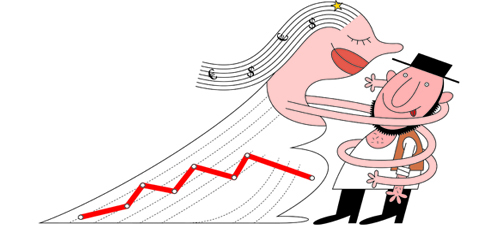“It took Portugal's prime minister, José Sócrates, two weeks to accept the inevitable but he finally got there,” writes *The Guardian*. "By calling on Brussels for an emergency loan, Mr Sócrates was indeed taking the most drastic of all measures available to him – but he was also only doing what European policymakers, financial markets and many Portuguese had been expecting for days.”
In fact, the London daily concludes, the Portuguese Prime Minister had “run out of options” following his resignation on March 23, when Parliament turned down his new austerity programme. “That evening Portugal entered political limbo – and became the financial-market equivalent of a dead man walking."
“It will not be easy to accept more austerity, but it will be impossible to accept more demagoguery, denial of reality, political incompetence and lack of responsibility,” fumes Público in its leader. “The return of the International Monetary Fund (IMF) represents a severe defeat for Portugal.”
Teresa de Sousa writes in an editorial in the same newspaper that the decision by the Portuguese government had been on the wind since José Sócrates’s resignation and that it came when the interest rate on Portugal’s short-term debt had reached a dangerously high level. As the Guardian explains, “Portugal would have needed to borrow an ever-increasing amount from financiers just to pay the interest it owed them.” In short, Teresa de Sousa sums up, “it was not worth the trouble to continue to hold out”.
“The request for emergency foreign aid before the parliamentary elections of June 5 was one of the scenarios that the Prime Minister had on the table the day he submitted his resignation,” Teresa de Sousa adds. “Despite the official denials of contacts with European authorities, this possibility had been raised for the first time at the European Council in Brussels on 24 and 25 March, just after the government resigned. The events have unfolded following the last three days of public lobbying by the major national banks, pressuring the government to go after emergency support from Europe.”
Other factors prompted the José Sócrates government to take the plunge, Teresa de Sousa continues:
“Firstly, the informal meeting of the ministers of economy and finance in Budapest [on 8 and 9 April], where the Portuguese government would have found itself confronted with demands from its European counterparts for an immediate clarification of the situation, which is seen as more difficult to sustain with each passing day. The Financial Times [newspaper] of Britain then confirmed [on April 6] Público’s revelationsfrom the day before of the contact between the Portuguese and European authorities on the manner in which emergency aid could be obtained from the European Commission. Despite official denials, sources close to the government have confirmed to Público that contacts had taken place between government, the Commission and the IMF.”
Unlike the case of Greece and Ireland, Brussels is confronting a special situation with Portugal, Teresa de Sousa concludes, as “Brussels will have to hold talks with the government, the President of the Republic and with the parties that may come to power after the elections.” The most likely hypothesis sees intervention by the European Stabilisation Mechanism (EFSM) and the IMF.
According to El País, the Portuguese request has “surprised no one, but was postponed for political reasons, as Jose Socrates was trying to pass the buck to the next government.”
The Portuguese will still have to cope with a “paradoxical situation,” concludes the Madrid daily, for rescue by the EU does not mean that its economic woes are over. The Portuguese economy will have to bring in a “drastic austerity plan, similar, or even tougher than the one Parliament had rejected on March 23”.
Regarding possible repercussions of the Portuguese crisis on the Spanish economy, the Spanish economy is “too big to fail, and too big to be saved,” El Paísadds, repeating a popular adage.
“An attack against the Spanish debt would actually be a threat to the euro as a whole: Spain is the boundary of [a] cold war between the financial markets and governments and a very real all-out war against the euro and the EU project itself[...]. The reaction of the markets in the coming days will confirm whether the domino theory is correct,” comments the paper, adding that the solvency of Spain differs markedly from that of Portugal and Ireland thanks to recently approved economic reforms that are “getting results”. That is why, El País concludes with some optimism, “the European debt crisis will very probably end with Portugal.”
The judgement from Austria is more severe. From Vienna, Der Standard headlines the “tissue of falsehoods” the euro is wrapped up in.
“This will pass, somehow. But with all this camouflage and deception, the credibility of the Eurozone has taken more than a scratch. Monetary union is becoming more and more an edifice of lies: the first was in claiming that Greece would escape without help. In lies two and three, Ireland and Portugal would also wriggle out by themselves. The golden Pinocchio, falsehood No. 4, involves the Eurozone, which continues to claim that states rescued with taxpayers' money could repay their debts without restructuring.”
Was this article useful? If so we are delighted!
It is freely available because we believe that the right to free and independent information is essential for democracy. But this right is not guaranteed forever, and independence comes at a cost. We need your support in order to continue publishing independent, multilingual news for all Europeans.
Discover our subscription offers and their exclusive benefits and become a member of our community now!












